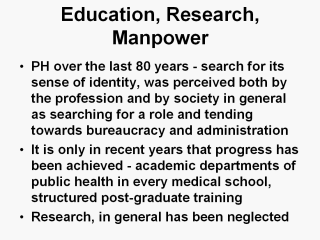| front |1 |2 |3 |4 |5 |6 |7 |8 |9 |10 |11 |12 |13 |14 |15 |16 |17 |18 |19 |20 |21 |22 |23 |24 |25 |26 |27 |review |
 |
One of the difficulties
that has bedeviled PH over the last 80 years has been a search for its sense
of identity as illustrated by its change of names. The specialty of PH was
perceived both by the profession and by society in general as searching for
a role and tending towards bureaucracy and administration. Perceptions do
not have to be true to be powerful and PH allowed itself to be seen as
confused and to become something Of a second class citizen in the medical
field. Over this time-span the teaching of PH in medical schools and elsewhere gradually deteriorated and in some places disappeared altogether. In spite of repeated attempts for example by the Goodenough Committee in 1944, it is only in recent years that progress has been achieved. There are now recognized academic departments of public health in every medical school and the Faculty has enabled structured post-graduate training and development to be introduced. Recruitment to the specialty has been variable over the years, both in quality and quantity. Only in recent years has it settled down in a most encouraging way. Research, except perhaps in epidemiology, has followed a variable course - but in general has been neglected. |